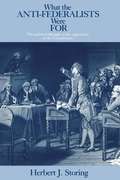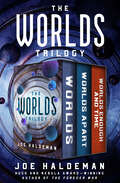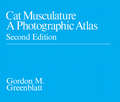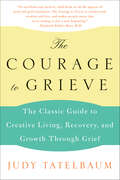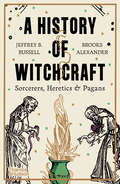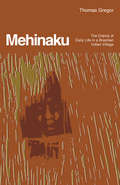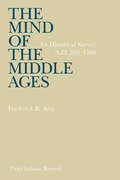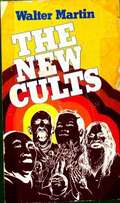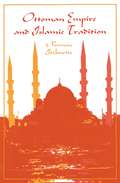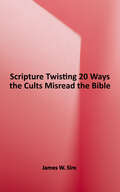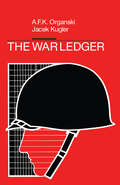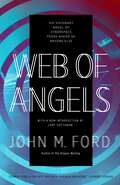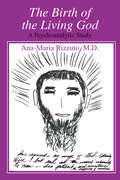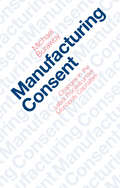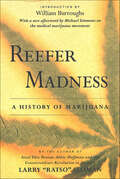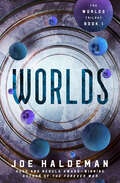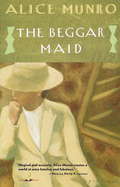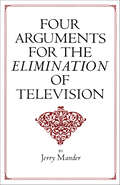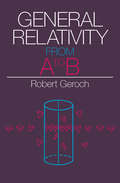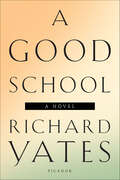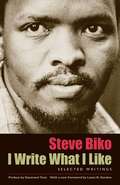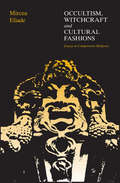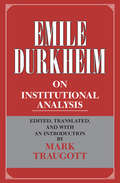- Table View
- List View
What the Anti-Federalists Were For: The Political Thought of the Opponents of the Constitution
by Herbert J. StoringThe Anti-Federalists, in Herbert J. Storing's view, are somewhat paradoxically entitled to be counted among the Founding Fathers and to share in the honor and study devoted to the founding. "If the foundations of the American polity was laid by the Federalists," he writes, "the Anti-Federalist reservations echo through American history; and it is in the dialogue, not merely in the Federalist victory, that the country's principles are to be discovered." It was largely through their efforts, he reminds us, that the Constitution was so quickly amended to include a bill of rights. Storing here offers a brilliant introduction to the thought and principles of the Anti-Federalists as they were understood by themselves and by other men and women of their time. His comprehensive exposition restores to our understanding the Anti-Federalist share in the founding its effect on some of the enduring themes and tensions of American political life. The concern with big government and infringement of personal liberty one finds in the writings of these neglected Founders strikes a remarkably timely note.
The Worlds Trilogy: Worlds, Worlds Apart, and Worlds Enough and Time (The Worlds Trilogy #1)
by Joe HaldemanThe acclaimed author of The Forever War imagines a future in which most of humanity has abandoned Earth, living in man-made habitats orbiting a troubled world. In Worlds, Worlds Apart, and Worlds Enough and Time, the acclaimed Hugo and Nebula Award–winning author of The Forever War imagines a near future rife with exhilarating and terrifying possibilities, when hundreds of thousands of human beings have abandoned the Earth&’s surface to live in man-made habitats orbiting the troubled planet. Haldeman&’s science fiction saga follows Marianne O&’Hara, a young inhabitant of the World known as New New York, from her arrival on Earth as a student who becomes seduced by radical politics, through her coming of age amid the Worlds&’ war and the habitats&’ devastation, and ultimately to Marianne&’s emergence as a leader—and possibly the last hope of the human race as it heads toward the stars. Stephen King said of the first book in Haldeman&’s trilogy, &“There are scenes in Worlds I will remember forever.&” These gripping novels will enthrall anyone interested in the future—that of our planet and of the human race.
Cat Musculature: A Photographic Atlas
by Gordon GreenblattThis series of brilliant photographs shows the dissection of the cat musculature. It is designed for use in conjunction with the third edition of Hyman's Comparative Vertebrate Anatomy, edited by Marvalee Wake, although it can be used with other textbooks. Every possible step has been taken to make the photographs easy to interpret and to follow. Reference indications to the Wake texts are included, and also concise data on the origin, insertion, and action of each muscle. The scale is such that in most cases no more than five muscles are shown per photograph, thus simplifying the task of visualizing the individual muscles. An invaluable aid for every student of cat anatomy.
The Courage to Grieve: The Classic Guide to Creative Living, Recovery, and Growth Through Grief
by Judy TatelbaumThis unusual self-help book about surviving grief offers the reader comfort and inspiration. Each of us will face some loss, sorrow and disappointment in our lives, and The Courage to Grieve provides the specific help we need to enable us to face our grief fully and to recover and grow from the experience. Although the book emphasizes the response to the death of a loved one, The Courage to Grieve can help with every kind of loss and grief.Judy Tatelbaum gives us a fresh look at understanding grief, showing us that grief is a natural, inevitable human experience, including all the unexpected, intense and uncomfortable emotions like sorrow, guilt, loneliness, resentment, confusion, or even the temporary loss of the will to live. The emphasis is to clarify and offer help, and the tone is spiritual, optimistic, creative and easy to understand. Judy Tatelbaum provides excellent advice on how to help oneself and others get through the immediate experience of death and the grief that follows, as well as how to understand the special grief of children. Particularly useful are the techniques for completing or "finishing" grief--counteracting the popular misconception that grief never ends. The Courage to Grieve shows us how to live life with the ultimate courage: not fearing death. This book is about so much more than death and grieving it is about life and joy and growth.
A History of Witchcraft (Third): Sorcerers, Heretics And Pagans
by Jeffrey B. Russell Brooks AlexanderAn authoritative and concise history of witchcraft from the ancient world up to the present day. Witchcraft has always been a fluid and intriguing belief system that has enchanted and sometimes terrified humanity. Now in its third edition, A History of Witchcraft has established itself as the authoritative history of witchery and the occult. Beginning with magic in the ancient world, Jeffrey B. Russell explores the definition of witchcraft in its many diverse forms, from the worship of the Greek goddess of magic, Hecate, and the witch crazes of the fifteenth and sixteenth centuries to the development of modern witchcraft by Aleister Crowley and Gerald Gardner in the early twentieth century. Brooks Alexander analyzes the development of witchcraft and neo-paganism in the present day, charting the dissemination of modern witchcraft through media and the tensions that arise when a secretive cult becomes an open and recognized religion. This updated edition features a new chapter exploring the challenges that witchcraft has faced in the past decade, including the rise of social media platforms such as Instagram and TikTok, the COVID-19 pandemic, and new neo-pagan groups.
The Man Who Killed Boys: The John Wayne Gacy, Jr. Story (St. Martin's True Crime Classics)
by Clifford L. Linedecker***Please note: This ebook edition does not contain the photos found in the print edition.***A true story of mass murder in a Chicago suburb.Successful businessman, community benefactor, good friend and neighbor-- and perverted mass murderer.Over a period of three years, John Wayne Gacy, Jr. sexually tortured and murdered 33 boys. His friends and neighbors in his unassuming Illinois community never suspected a thing. Gacy was a Jekyll-and-Hyde figure, leading an outwardly normal life, but secretly brutalizing dozens of young men in a hidden lair, and concealing their bodies under the floorboards of his suburban home.Through extensive personal interviews with those who knew Gacy, veteran true-crime scribe Clifford L. Linedecker takes us on a shocking ride through Gacy's life, delving deep into the man's troubled past, recounting his appalling series of murders, and recreating the drama of his trial-- which resulted in his execution by lethal injection in 1994. Gruesome and horrifying, The Man Who Killed Boys reveals stark terror set amid the daily lives of an ordinary community.
Mehinaku: The Drama of Daily Life in a Brazilian Indian Village
by Thomas GregorThomas Gregor sees the Mehinaku Indians of central Brazil as performers of roles, engaged in an ongoing improvisational drama of community life. The layout of the village and the architecture of the houses make the community a natural theater in the round, rendering the villagers' actions highly visible and audible. Lacking privacy, the Mehinaku have become masters of stagecraft and impression management, enthusiastically publicizing their good citizenship while ingeniously covering up such embarrassments as extramarital affairs and theft.
The Mind of the Middle Ages: An Historical Survey
by Frederick B. Artz"This is the third edition of a near standard survey of the intellectual life of the age of faith. Artz on the arts, as on philosophy, politics and other aspects of culture, makes lively and informative reading."—The Washington Post
Ottoman Empire and Islamic Tradition (A Phoenix book)
by Norman ItzkowitzThis skillfully written text presents the full sweep of Ottoman history from its beginnings on the Byzantine frontier in about 1300, through its development as an empire, to its late eighteenth-century confrontation with a rapidly modernizing Europe. Itzkowitz delineates the fundamental institutions of the Ottoman state, the major divisions within the society, and the basic ideas on government and social structure. Throughout, Itzkowitz emphasizes the Ottomans' own conception of their historical experience, and in so doing penetrates the surface view provided by the insights of Western observers of the Ottoman world to the core of Ottoman existence.
Scripture Twisting: 20 Ways The Cults Misread the Bible
by James W. SireHow often have you encountered some bizarre doctrine only to be stunned to hear a Bible verse quoted to support it? With new religious cults springing up almost daily and old ones growing rapidly, this is more and more common. How are they seemingly able to twist Scripture to mean something orthodox Christians have never believed it to mean in two thousand years? James Sire, author of The Universe Next Door and How to Read Slowly, has isolated twenty separate kinds of reading errors which are characteristically made by cultists as they interpret the Bible. He covers the full range from simple misquotation to complex argumentation which links one slightly eccentric interpretation to another, mixes in a few orthodox readings and ends with a conclusion totally foreign to the biblical world view. Sire also handles twisted translation, over specification, virtue by association, ignoring the context, and other flawed interpretations. A book to help us all become better readers of the Scriptures.
The War Ledger
by Jacek Kugler A.F.K. OrganskiThe War Ledger provides fresh, sophisticated answers to fundamental questions about major modern wars: Why do major wars begin? What accounts for victory or defeat in war? How do victory and defeat influence the recovery of the combatants? Are the rules governing conflict behavior between nations the same since the advent of the nuclear era? The authors find such well-known theories as the balance of power and collective security systems inadequate to explain how conflict erupts in the international system. Their rigorous empirical analysis proves that the power-transition theory, hinging on economic, social, and political growth, is more accurate; it is the differential rate of growth of the two most powerful nations in the system—the dominant nation and the challenger—that destabilizes all members and precipitates world wars. Predictions of who will win or lose a war, the authors find, depend not only on the power potential of a nation but on the capability of its political systems to mobilize its resources—the "political capacity indicator." After examining the aftermath of major conflicts, the authors identify national growth as the determining factor in a nation's recovery. With victory, national capabilities may increase or decrease; with defeat, losses can be enormous. Unexpectedly, however, in less than two decades, losers make up for their losses and all combatants find themselves where they would have been had no war occurred. Finally, the authors address the question of nuclear arsenals. They find that these arsenals do not make the difference that is usually assumed. Nuclear weapons have not changed the structure of power on which international politics rests. Nor does the behavior of participants in nuclear confrontation meet the expectations set out in deterrence theory.
Web of Angels
by John M. FordFrom the brilliant author of The Dragon Waiting and Growing Up Weightless, a novel that saw the cyberpunk future with stunning clarity, years before anyone else.Originally published in 1980, the legendary John M. Ford’s first published novel was an uncannily brilliant anticipation of the later cyberpunk genre—and of the internet itself.The Web links the many worlds of humanity. Most people can only use it to communicate. Some can retrieve and store data, as well as use simple precoded programs. Only a privileged few are able to create their own software, within proscribed limits.And then there are the Webspinners.Grailer is Fourth Literate, able to manipulate the Web at will—and use it for purposes unintended and impossible for anyone but the most talented Webspinner. Obviously, he cannot be allowed to live.Condemned to death at the age of nine, Grailer must go underground, hiding his skills, testing his powers- until he is ready to do battle with the Web itself.With a new introduction from Cory Doctorow, written especially for this edition.At the Publisher's request, this title is being sold without Digital Rights Management Software (DRM) applied.
The Birth of the Living God: A Psychoanalytic Study
by Ana-Marie Rizzuto M.D.Utilizing both clinical material based on the life histories of twenty patients and theoretical insights from the works of Freud, Erikson, Fairbairn, and Winnicott, Ana-Maria Rizzuto examines the origin, development, and use of our God images. Whereas Freud postulated that belief in God is based on a child's idea of his father, Rizzuto argues that the God representation draws from a variety of sources and is a major element in the fabric of one's view of self, others, and the world.
Manufacturing Consent: Changes in the Labor Process Under Monopoly Capitalism
by Michael BurawoySince the 1930s, industrial sociologists have tried to answer the question, Why do workers not work harder? Michael Burawoy spent ten months as a machine operator in a Chicago factory trying to answer different but equally important questions: Why do workers work as hard as they do? Why do workers routinely consent to their own exploitation?Manufacturing Consent, the result of Burawoy's research, combines rich ethnographical description with an original Marxist theory of the capitalist labor process. Manufacturing Consent is unique among studies of this kind because Burawoy has been able to analyze his own experiences in relation to those of Donald Roy, who studied the same factory thirty years earlier. Burawoy traces the technical, political, and ideological changes in factory life to the transformations of the market relations of the plant (it is now part of a multinational corporation) and to broader movements, since World War II, in industrial relations.
Reefer Madness: A History of Marijuana
by Larry "Ratso" SlomanReefer Madness, a classic in the annals of hemp literature, is the popular social history of marijuana use in America. Beginning with the hemp farming of George Washington, author Larry "Ratso" Sloman traces the fascinating story of our nation's love-hate relationship with the resilient weed we know as marijuana. Herein we find antiheroes such as Allen Ginsberg, Robert Mitchum (the first Hollywood actor busted for pot), Louis Armstrong (who smoked pot every day), the Beatles, and more rapscallions standing up for, supporting, smoking, and politicizing the bounties of marijuana. With a new afterword by Michael Simmons, who has written for Rolling Stone, LA Weekly, and High Times, on the progress of the hemp movement and the importance of medical marijuana, Reefer Madness is a classic that goes on.
Worlds: A Novel Of The Near Future (The Worlds Trilogy #1)
by Joe HaldemanIn this near-future novel by the author of The Forever War, an idealistic student visiting Earth from an orbiting colony is ensnared in a political conspiracy. By the close of the twenty-first century, almost half a million souls have already abandoned Earth to live in satellites orbiting the strife-ridden planet. Each of these forty-one Worlds is an independent entity boasting its own government and culture, yet each remains bound to the troubled home World by economic pressure. A brilliant student of political science born and raised in New New York, the largest of the orbiting Worlds, young Marianne O&’Hara has never been to the surface but now has a golden opportunity to continue her studies far below her floating home of steel. Life on Earth, however, is very different from anything she has ever experienced. With power in the hands of a privileged few and unrest running rampant, the allure of radical politics might be too much for an idealistic and inexperienced young World dweller to resist. But even the best of intentions can have disastrous consequences, and Marianne soon finds herself unwittingly drawn into a wide-ranging conspiracy that could result in the total destruction of everything on Earth . . . and above. The first book in the acclaimed science fiction trilogy by Hugo and Nebula Award–winning author Joe Haldeman, Worlds offers a powerful vision of a possible future.This ebook features an illustrated biography of Joe Haldeman including rare images from the author&’s personal collection.
The Beggar Maid: Stories of Flo and Rose (Vintage International)
by Alice Munro&“An exhilarating collection&” (The New York Times Book Review) of ten blended stories from Nobel Prize–winning author Alice Munro &“The rich texture of its narrative and the author&’s graceful style make [The Beggar Maid] a considerable accomplishment.&”—Joyce Carol Oates, Ms. In this vibrant series of interweaving stories, Alice Munro recreates the evolving bond—one that is both constricting and empowering—between two women in the course of almost forty years. One is Flo, practical, suspicious of other people&’s airs, at times dismayingly vulgar. The other is Rose, Flo&’s stepdaughter, a clumsy, shy girl who somehow—in spite of Flo&’s ridicule and ghastly warnings—leaves the small town she grew up in to achieve her own equivocal success in the larger world.
Four Arguments for the Elimination of Television
by Jerry ManderA total departure from previous writing about television, this book is the first ever to advocate that the medium is not reformable. Its problems are inherent in the technology itself and are so dangerous—to personal health and sanity, to the environment, and to democratic processes—that TV ought to be eliminated forever.Weaving personal experiences through meticulous research, the author ranges widely over aspects of television that have rarely been examined and never before joined together, allowing an entirely new, frightening image to emerge. The idea that all technologies are "neutral," benign instruments that can be used well or badly, is thrown open to profound doubt. Speaking of TV reform is, in the words of the author, "as absurd as speaking of the reform of a technology such as guns."
General Relativity from A to B
by Robert Geroch"This beautiful little book is certainly suitable for anyone who has had an introductory course in physics and even for some who have not."—Joshua N. Goldberg, Physics Today "An imaginative and convincing new presentation of Einstein's theory of general relativity. . . . The treatment is masterful, continual emphasis being placed on careful discussion and motivation, with the aim of showing how physicists think and develop their ideas."—Choice
A Good School: A Novel
by Richard YatesRichard Yates, who died in 1992, is today ranked by many readers, scholars, and critics alongside such titans of modern American fiction as Updike, Roth, Irving, Vonnegut, and Mailer.In this work, he offers a spare and autumnal novel about a New England prep school. At once a meditation on the twilight of youth and an examination of America's entry into World War II, A Good School tells the stories of William Grove, the quiet boy who becomes an editor of the school newspaper; Jack Draper, a crippled chemistry teacher; and Edith Stone, the schoolmaster's young daughter, who falls in love with most celebrated boy in the class of 1943.
I Write What I Like: Selected Writings
by Steve Biko"The most potent weapon in the hands of the oppressor is the mind of the oppressed." Like all of Steve Biko's writings, those words testify to the passion, courage, and keen insight that made him one of the most powerful figures in South Africa's struggle against apartheid. They also reflect his conviction that black people in South Africa could not be liberated until they united to break their chains of servitude, a key tenet of the Black Consciousness movement that he helped found.I Write What I Like contains a selection of Biko's writings from 1969, when he became the president of the South African Students' Organization, to 1972, when he was prohibited from publishing. The collection also includes a preface by Archbishop Desmond Tutu; an introduction by Malusi and Thoko Mpumlwana, who were both involved with Biko in the Black Consciousness movement; a memoir of Biko by Father Aelred Stubbs, his longtime pastor and friend; and a new foreword by Professor Lewis Gordon. Biko's writings will inspire and educate anyone concerned with issues of racism, postcolonialism, and black nationalism.
Nocturnes for the King of Naples
by Edmund WhiteThe letters of a seducer to the great love of his life, a sensual tour-de-force by &“the paterfamilias of queer literature&” (New York Times)&“Can&’t sleep tonight. Was lying in bed reading the biography of a great man whose genius deserted him . . . The genius who deserted me was you.&” In a series of late-night letters, gorgeous, funny, filled with memory, sensuality, and regret, a seducer calls across the years to the great love of his youth: an older, revered expatriate known, in his adoptive city, as the King of Naples. As the narrator evokes their affair, in scenes of beauty and remorse, his memories range over the men who came after and before, especially the seductive father who still haunts his erotic imagination. First published in 1978, before the trilogy of frankly autobiographical novels that made him famous, Nocturnes for the King of Naples reveals Edmund White at his most poetic, playful, and evocative, a magician on the level of James Salter, James Merrill, or Vladimir Nabokov.
Occultism, Witchcraft, and Cultural Fashions: Essays in Comparative Religion
by Mircea EliadeIn the period domoninated by the triumphs of scientific rationalism, how do we account for the extraordinary success of such occult movements as astrology or the revival of witchcraft? From his perspective as a historian of religions, the eminent scholar Mircea Eliade shows that such popular trends develop from archaic roots and periodically resurface in certain myths, symbols, and rituals. In six lucid essays collected for this volume, Eliade reveals the profound religious significance that lies at the heart of many contemporary cultural vogues. Since all of the essays except the last were originally delivered as lectures, their introductory character and lively oral style make them particularly accessible to the intelligent nonspecialist. Rather than a popularization, Occultism, Witchcraft, and Cultural Fashions is the fulfillment of Eliade's conviction that the history of religions should be read by the widest possible audience.
On Institutional Analysis (Heritage Of Sociology Ser.)
by Emile DurkheimRanging from Durkheim's original lecture in sociology to an excerpt from the work incomplete at his death, these selections illuminate his multiple approaches to the crucial concept of social solidarity and the study of institutions as diverse as the law, morality, and the family. Durkheim's focus on social solidarity convinced him that sociology must investigate the way that individual behavior itself is the product of social forces. As these writings make clear, Durkheim pursued his powerful model of sociology through many fields, eventually synthesizing both materialist and idealist viewpoints into his functionalist model of society.
